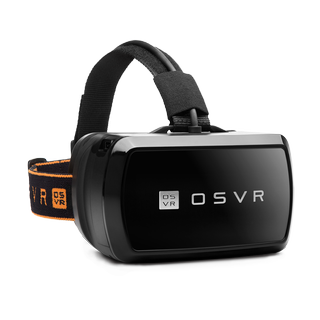OSVR Progress Continues: More Supporters, New Developer Kit And More

Open Source VR is on a mission to create an open standard for VR and has been working diligently all year to make that happen. The organizers of OSVR have announced the launch of a content discovery system that should make it easier to find VR content, from games to 360-degree videos, and a new version of the Hacker Developer kit with a better screen is coming soon. The group also revealed that 65 more companies have been added to the supporters list.
Content Discovery
OSVR's content discovery system is designed to make it easier for VR enthusiasts to find OSVR-supported content, be it games or video. The service will feature curated content from all OSVR partners, and it will be rotated on a regular basis. In addition to listing content hosted by OSVR, the service will provide a list of VR stores that have OSVR-supported content. OSVR said that content from services such as Boondogl, Qihoo360, Razer Cortex, Steam and others will be available.

Hacker Development Kit
In addition to the content service, OSVR has announced that a new version of the Hacker Development kit will be released soon. HDK v1.3 features improved optics that should allow for a sharper image. OSVR said that the new optics module will do away with the need for an IPD adjustment, but will accommodate individual eye focus adjustment, making it possible for those who wear glasses to use the headset without them.
The HDK v1.3 will also include an upgraded display. The 5.5-inch Full HD OLED display included with HDK v1.3 is capable of 120 Hz. OSVR said that this new model improves upon v1.2, meaning it should come with the IR kit that v1.2 includes.
Software Updates
First and foremost, OSVR considers itself a software platform, so it stands to reason that there would be a software update along with the developer kit announcement. The latest update introduces OSVR Render Manager, designed for optimal low-latency rendering on any OSVR device.
Currently, OSVR Render Manager supports Nvidia GameWorks VR, which enables Direct Mode for plug and play compatibility of VR headsets and Front Render Buffering, which reduces latency by rendering directly to the front buffer. Context Priority is also supported, which allows developers control of GPU scheduling, thereby enabling them to use asynchronous time warp so there's no need to re-render each frame every time a gamer's head moves.
Stay on the Cutting Edge
Join the experts who read Tom's Hardware for the inside track on enthusiast PC tech news — and have for over 25 years. We'll send breaking news and in-depth reviews of CPUs, GPUs, AI, maker hardware and more straight to your inbox.
OSVR Performance Profiler has also been added to the OSVR SDK. This tool uses the Event Tracing for Windows (ETW) service to identify performance bottlenecks in the software stack. ETW gives developers the ability to visualize and inspect application or kernel-defined event logs in a graphic interface.
New Supporters
OSVR has been growing the number of supporting companies involved in the project at a rapid pace. The organizers of Open Source VR have announced that an additional 65 supporting companies have recently joined OSVR's mission, bringing the total number of supporting companies to 230.
Some of the new partners include Motion Reality Inc., a manufacturer of tactical training simulators to military and law enforcement; itch.io, an open marketplace for indie games; and BoostVC, a venture capital firm based in Silicon Valley that invests in early stage VR companies. Many other companies, from hardware designers to software and game developers, along with video content creators, have announced support as well.
Pre-orders for the kits will open up on the first of October, and deliveries are supposed to start later that month. The content discovery system is available now and can be found at http://www.osvr.org/featured.
Update, 9/8/15, 6:55am PT: The original post said the new screen is not capable of 120Hz; it was meant to say that it is capable of 120Hz.
Follow Kevin Carbotte @pumcypuhoy. Follow us @tomshardware, on Facebook and on Google+.
Kevin Carbotte is a contributing writer for Tom's Hardware who primarily covers VR and AR hardware. He has been writing for us for more than four years.
-
Sakkura You say the HDK v1.3 display is not capable of 120Hz, but the OSVR site (and other news sources) says it's 120Hz.Reply -
kcarbotte ReplyYou say the HDK v1.3 display is not capable of 120Hz, but the OSVR site (and other news sources) says it's 120Hz.
You are absolutely right, and this was meant to say as much.
thank you for pointing out the error. It has been corrected.
Most Popular


